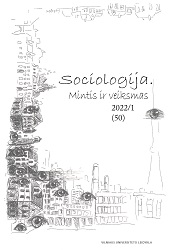1970–1984 metais Lietuvoje gimusios kohortos reprodukciniai sprendimai
Reproductive Decisions of the 1970–1984 Cohort Born in Lithuania
Author(s): Ernesta PlatūkytėSubject(s): Social history, Demography and human biology, Sociobiology, Post-War period (1950 - 1989)
Published by: Vilniaus Universiteto Leidykla
Keywords: life course; childbearing; reproduction; procreational decisions;
Summary/Abstract: Even though childbirth in developed societies is increasingly associated with compromises in pursuit of a professional career, education, or other important goals, parenthood has remained an important significant life stage in the process of family formation. Change of structural and contextual circumstances influences the decision of individuals on whether to have children or not, and this increasingly depends on the desire to fulfil personal wishes and satisfy personal needs. Using qualitative research, this paper analyzes the reproductive decisions of a cohort born in Lithuania during the period of 1970–1984. The research informants are often referred to as a generation of a “natural social experiment”; a generation that experienced an active stage of family life in the conditions of drastic societal change. An analysis of personal accounts displays that for this generation, marriage had been the most favourable form of family formation, and procreative decisions were greatly influenced by the prevailing contextual circumstances in society. Maintaining the sequence of normativity of the life course created favourable conditions for those born in Lithuania in 1970–1984 to have children, and procreative expectations were associated with the institutionalization of family relations.
Journal: Sociologija. Mintis ir Veiksmas
- Issue Year: 2022
- Issue No: 50 (01)
- Page Range: 44-65
- Page Count: 22
- Language: Lithuanian

